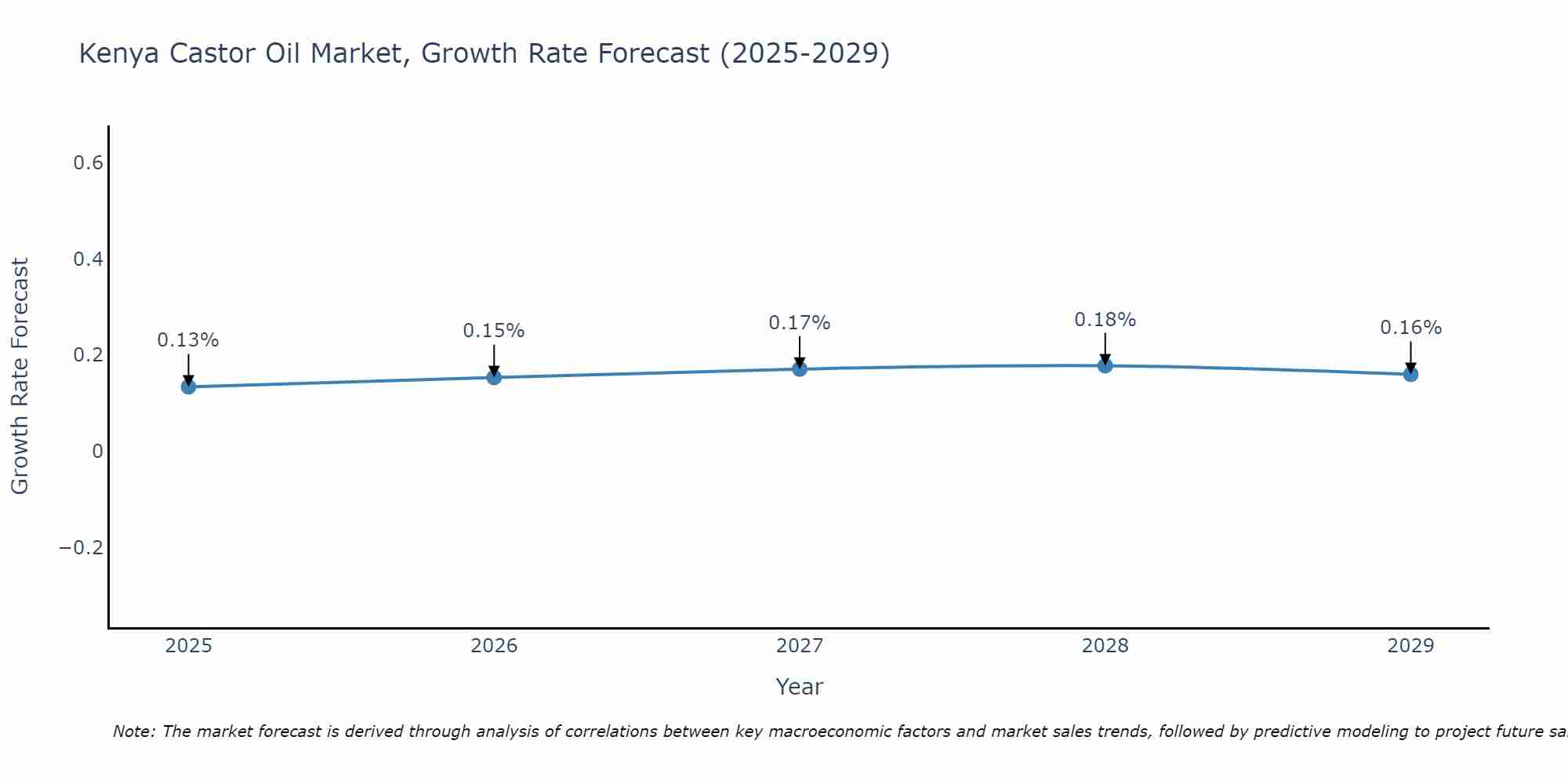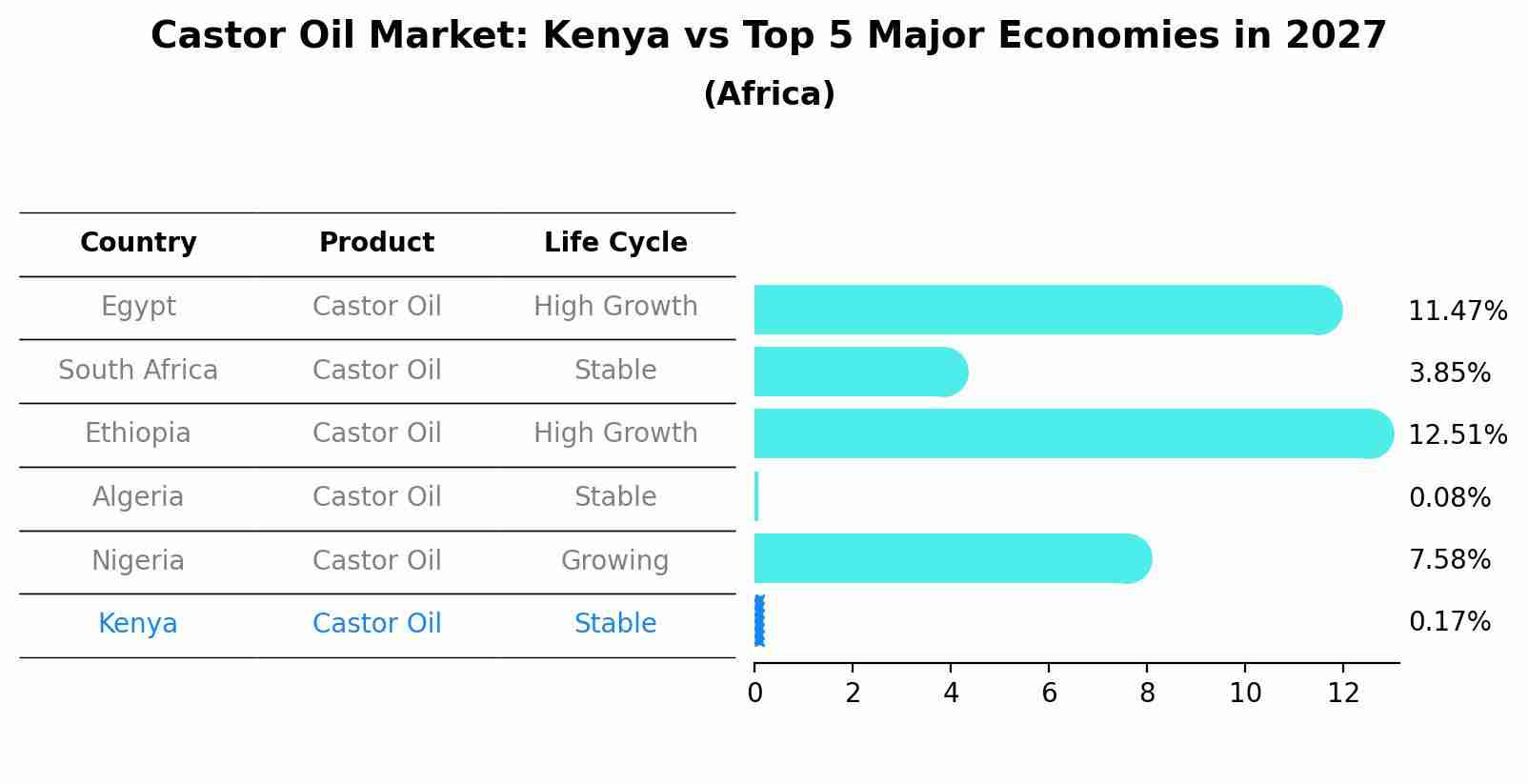Kenya Castor Oil Market Outlook | Revenue, Share, Size, Trends, Companies, Forecast, Analysis, Industry, Value, Growth & COVID-19 IMPACT
| Product Code: ETC410086 | Publication Date: Oct 2022 | Updated Date: Apr 2025 | Product Type: Market Research Report | |
| Publisher: 6Wresearch | Author: Ravi Bhandari | No. of Pages: 75 | No. of Figures: 35 | No. of Tables: 20 |
Kenya Castor Oil Market Size Growth Rate
The Kenya Castor Oil Market is projected to witness mixed growth rate patterns during 2025 to 2029. Starting at 0.13% in 2025, the market peaks at 0.18% in 2028, and settles at 0.16% by 2029.

Castor Oil Market: Kenya vs Top 5 Major Economies in 2027 (Africa)
By 2027, Kenya's Castor Oil market is forecasted to achieve a stable growth rate of 0.17%, with Egypt leading the Africa region, followed by South Africa, Ethiopia, Algeria and Nigeria.

Kenya Castor Oil Market Overview
The Kenya Castor Oil Market is experiencing growth due to the oil`s diverse applications in pharmaceuticals, cosmetics, and industrial sectors. Castor oil, known for its medicinal properties, is also used in the production of lubricants and biodiesel. Kenya agricultural sector is well-positioned to support increased castor bean cultivation.
Drivers of the market
In Kenya, the castor oil market is driven by the rising awareness regarding the numerous health benefits and industrial applications of castor oil. Castor oil is widely utilized in pharmaceuticals, cosmetics, food & beverages, and industrial sectors due to its medicinal properties, lubricating characteristics, and bio-based nature. The increasing inclination towards natural and organic products among consumers, coupled with the expanding industrial applications of castor oil, augments the market demand. Furthermore, government initiatives aimed at promoting castor cultivation and value addition activities contribute to market growth.
Challenges of the market
The Kenya Castor Oil Market confronts several challenges. Firstly, limited cultivation of castor beans and processing facilities in Kenya may lead to dependence on imports, affecting market competitiveness and supply chain resilience. Secondly, addressing quality control and consistency issues in castor oil production is crucial for meeting industry standards and customer requirements. Additionally, navigating price volatility and fluctuations in global castor oil prices poses challenges for cost management and pricing strategies. Moreover, ensuring sustainable sourcing practices and ethical supply chain management in the castor oil industry is essential for environmental stewardship and social responsibility. Finally, fostering partnerships and collaborations with international suppliers and technology providers can help improve domestic production capabilities and drive market growth in Kenya.
Government Policy of the market
The Kenya government supports the castor oil market through policies focused on enhancing agricultural productivity and processing capabilities. Efforts include providing farmers with access to quality seeds, offering training on sustainable farming practices, and facilitating the establishment of processing facilities. Additionally, the government promotes the use of castor oil in various industries, including cosmetics and biofuels, to increase demand and market potential.
Key Highlights of the Report:
- Kenya Castor Oil Market Outlook
- Market Size of Kenya Castor Oil Market, 2021
- Forecast of Kenya Castor Oil Market, 2028
- Historical Data and Forecast of Kenya Castor Oil Revenues & Volume for the Period 2018 - 2028
- Kenya Castor Oil Market Trend Evolution
- Kenya Castor Oil Market Drivers and Challenges
- Kenya Castor Oil Price Trends
- Kenya Castor Oil Porter's Five Forces
- Kenya Castor Oil Industry Life Cycle
- Historical Data and Forecast of Kenya Castor Oil Market Revenues & Volume By End Use for the Period 2018 - 2028
- Historical Data and Forecast of Kenya Castor Oil Market Revenues & Volume By Pharmaceuticals for the Period 2018 - 2028
- Historical Data and Forecast of Kenya Castor Oil Market Revenues & Volume By Lubricants for the Period 2018 - 2028
- Historical Data and Forecast of Kenya Castor Oil Market Revenues & Volume By Paints for the Period 2018 - 2028
- Historical Data and Forecast of Kenya Castor Oil Market Revenues & Volume By Soaps for the Period 2018 - 2028
- Historical Data and Forecast of Kenya Castor Oil Market Revenues & Volume By Others for the Period 2018 - 2028
- Kenya Castor Oil Import Export Trade Statistics
- Market Opportunity Assessment By End Use
- Kenya Castor Oil Top Companies Market Share
- Kenya Castor Oil Competitive Benchmarking By Technical and Operational Parameters
- Kenya Castor Oil Company Profiles
- Kenya Castor Oil Key Strategic Recommendations
Frequently Asked Questions About the Market Study (FAQs):
- Single User License$ 1,995
- Department License$ 2,400
- Site License$ 3,120
- Global License$ 3,795
Search
Thought Leadership and Analyst Meet
Our Clients
Related Reports
- Canada Oil and Gas Market (2026-2032) | Share, Segmentation, Value, Industry, Trends, Forecast, Analysis, Size & Revenue, Growth, Competitive Landscape, Outlook, Companies
- Germany Breakfast Food Market (2026-2032) | Industry, Share, Growth, Size, Companies, Value, Analysis, Revenue, Trends, Forecast & Outlook
- Australia Briquette Market (2025-2031) | Growth, Size, Revenue, Forecast, Analysis, Trends, Value, Share, Industry & Companies
- Vietnam System Integrator Market (2025-2031) | Size, Companies, Analysis, Industry, Value, Forecast, Growth, Trends, Revenue & Share
- ASEAN and Thailand Brain Health Supplements Market (2025-2031) | Strategy, Consumer Insights, Analysis, Investment Trends, Opportunities, Growth, Size, Share, Industry, Revenue, Segments, Value, Segmentation, Supply, Forecast, Restraints, Outlook, Competition, Drivers, Trends, Demand, Pricing Analysis, Competitive, Strategic Insights, Companies, Challenges
- ASEAN Bearings Market (2025-2031) | Strategy, Consumer Insights, Analysis, Investment Trends, Opportunities, Growth, Size, Share, Industry, Revenue, Segments, Value, Segmentation, Supply, Forecast, Restraints, Outlook, Competition, Drivers, Trends, Demand, Pricing Analysis, Competitive, Strategic Insights, Companies, Challenges
- Europe Flooring Market (2025-2031) | Outlook, Share, Industry, Trends, Forecast, Companies, Revenue, Size, Analysis, Growth & Value
- Saudi Arabia Manlift Market (2025-2031) | Outlook, Size, Growth, Trends, Companies, Industry, Revenue, Value, Share, Forecast & Analysis
- Uganda Excavator, Crane, and Wheel Loaders Market (2025-2031) | Strategy, Consumer Insights, Analysis, Investment Trends, Opportunities, Growth, Size, Share, Industry, Revenue, Segments, Value, Segmentation, Supply, Forecast, Restraints, Outlook, Competition, Drivers, Trends, Demand, Pricing Analysis, Competitive, Strategic Insights, Companies, Challenges
- Rwanda Excavator, Crane, and Wheel Loaders Market (2025-2031) | Strategy, Consumer Insights, Analysis, Investment Trends, Opportunities, Growth, Size, Share, Industry, Revenue, Segments, Value, Segmentation, Supply, Forecast, Restraints, Outlook, Competition, Drivers, Trends, Demand, Pricing Analysis, Competitive, Strategic Insights, Companies, Challenges
Industry Events and Analyst Meet
Whitepaper
- Middle East & Africa Commercial Security Market Click here to view more.
- Middle East & Africa Fire Safety Systems & Equipment Market Click here to view more.
- GCC Drone Market Click here to view more.
- Middle East Lighting Fixture Market Click here to view more.
- GCC Physical & Perimeter Security Market Click here to view more.
6WResearch In News
- Doha a strategic location for EV manufacturing hub: IPA Qatar
- Demand for luxury TVs surging in the GCC, says Samsung
- Empowering Growth: The Thriving Journey of Bangladesh’s Cable Industry
- Demand for luxury TVs surging in the GCC, says Samsung
- Video call with a traditional healer? Once unthinkable, it’s now common in South Africa
- Intelligent Buildings To Smooth GCC’s Path To Net Zero


















